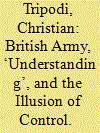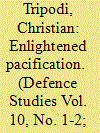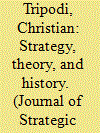|
|
|
Sort Order |
|
|
|
Items / Page
|
|
|
|
|
|
|
| Srl | Item |
| 1 |
ID:
091487


|
|
|
|
|
| Publication |
2009.
|
| Summary/Abstract |
This article examines the ways and means in which states employ irregular and indigenous personnel in a counter-insurgency (COIN) or counter-terrorist (CT) campaign, in the historical and contemporary context. The authors clarify the terminology surrounding this neglected area of COIN/CT theory, and identify four types of indigenous assistance - individual actors (trackers, interpreters, informers and agents); home guards and militias; counter-gangs; and pseudo-gangs. This article concludes that while the use of such indigenous irregulars has its advantages for the state and its armed/security forces (particularly as far as intelligence, local knowledge and undermining the insurgent's cause is concerned), it can also have serious practical and ethical implications for a COIN/CT campaign, and can have unexpected and unwelcome consequences including violations of laws of armed conflict, the undermining of governmental authority and the prospects of endemic internal strife and state collapse.
|
|
|
|
|
|
|
|
|
|
|
|
|
|
|
|
| 2 |
ID:
160026


|
|
|
|
|
| Summary/Abstract |
Over the past decade, Western military doctrines concerned with matters of irregular warfare and counterinsurgency have emphasised the requirement for properly ‘understanding’ the social, political and cultural environments in which those militaries may operate; the so-called human and socio-political ‘terrain’. This has led to a number of advancements and initiatives designed to facilitate the way that militaries may enhance that understanding. One of those initiatives has been the emergence from within the British military of a doctrine – JDP 04 ‘Understanding’ – designed for that purpose. Using that doctrine and other subsequent publications as a template, this article will examine the utility of ‘understanding’ for those commanders seeking to match military activities with political ends. It proposes that while any advances in understanding the operating environment are to be applauded, the ‘understanding’ of greatest importance is that relating to the feasibility of the strategic objectives at hand. If those objectives lack inherent feasibility, then the development of subordinate forms of understanding, particularly in relation to the socio-political dynamics of target societies, will likely only serve to slow the process of failure.
|
|
|
|
|
|
|
|
|
|
|
|
|
|
|
|
| 3 |
ID:
096508


|
|
|
| 4 |
ID:
090363


|
|
|
|
|
| Publication |
2009.
|
| Summary/Abstract |
This article examines the long-running debate over the application of the "Sandeman System" of pacification to the North-West Frontier of British India in 1877-1947. Colonel Sir Robert Sandeman's innovative doctrine of tribal administration had enabled the peaceful spread of British influence across Baluchistan during the late nineteenth century, yet the Government of India subsequently declared his methods inapplicable to the neighboring and perennially turbulent North-West Frontier. This essay seeks to provide a fuller understanding of the reasoning behind the policymakers' opposition to Sandeman's techniques and thus provide clarification of a debate that bedeviled British Frontier policy for over six decades.
|
|
|
|
|
|
|
|
|
|
|
|
|
|
|
|
| 5 |
ID:
099705


|
|
|
|
|
| Publication |
2010.
|
| Summary/Abstract |
This article comprises a reply to those who seek to use the British historical experience in Afghanistan in order to draw parallels with current operations in that country. It argues that, while the conceptual and physical response to the issue of Afghanistan on the part of Empire policy-makers during the period 1839-1919 was characterised by periods of indecision and mistaken assumptions, their grasp of strategic principles allowed the formulation of a series of Afghan policies that would serve to protect and indeed enhance British interests in the region for over a century and which stand in stark contrast to the seemingly incoherent Afghan strategy articulated by the current British government.
|
|
|
|
|
|
|
|
|
|
|
|
|
|
|
|
| 6 |
ID:
080868


|
|
|
|
|
| Publication |
2008.
|
| Summary/Abstract |
In light of present day calls for increased levels of cultural understanding on the part of Western forces engaged in conflict, this article assesses the utility of such knowledge in light of the British experience of the North-West Frontier of India 1901-1945. By using the British concept of the Political Officer as an example, it proposes that while cultural understanding is of genuine importance when operating in such a challenging environment, possession of it does not necessarily aid either the design or implementation of successful policy. As the British experience on the Frontier during this period illustrates, cultural awareness and understanding may be possessed in abundance, and the mechanisms for achieving such a state of understanding may be advanced, but traditional factors such as a cultural bias on the part of policy-makers, conservatism, underfunding, local resistance to unfamiliar concepts and a fractured civil-military relationship will dominate such awareness and overshadow the benefits that it may provide.
|
|
|
|
|
|
|
|
|
|
|
|
|
|
|
|
| 7 |
ID:
156672


|
|
|
|
|
| Summary/Abstract |
In his 1987 work Strategy: The Logic of War and Peace (Harvard University Press, Cambridge, MA, 1987), Edward Luttwak described strategy as a field of activity characterised not only by an innately complex relationship between designs, actions and outcomes, but so too by the frequent disparity between its theory and praxis. Similar observations on this subject have since been made by Richard K. Betts, Lawrence Freedman and Antulio Echevarria II. This article will use the Allied invasion of Sicily in July–August 1943 as a vehicle through which to test these theories against a signal event in the European theatre of the Second World War. It will illustrate how Operation Husky and its aftermath are a paradigm of the confusing and often illogical course of events associated with the process of formulating strategy and waging war. In so doing it demonstrates the benefits of using strategic theory to illuminate events and so move beyond the often insular focus of campaign histories, and simultaneously reinforces the importance of military history in informing a theoretical understanding of strategy.
|
|
|
|
|
|
|
|
|
|
|
|
|
|
|
|
|
|
|
|
|